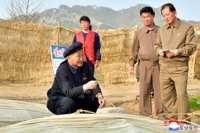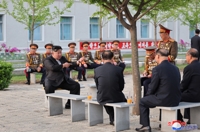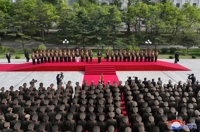(LEAD) Park urges Abe to inherit Japan's previous statements of apology
(ATTN: RECASTS throughout with comments by Park; CHANGES headline)
SEOUL, Aug. 3 (Yonhap) -- President Park Geun-hye on Monday urged Japanese Prime Minister Shinzo Abe to reaffirm Tokyo's previous statements of apology on shared history with South Korea, a key issue that could set the tone for the future of relations between the two neighbors.
South Korea and Japan are close economic partners and key allies of the United States, though they have long been in conflict over territory and other historical disputes stemming from Japan's 1910-45 colonial rule of the Korean Peninsula.
Park said she hopes that Abe "will clearly reaffirm the recognition of history by previous Japanese administrations," in his upcoming speech, which she said could lay the foundation for the future of bilateral ties.
Park made the comments in a meeting with Katsuya Okada, leader of Japan's opposition Democratic Party, at Cheong Wa Dae, South Korea's presidential office.
Abe's speech, which is expected to be delivered next week to mark the 70th anniversary of the end of World War II, will be closely watched by South Korea, China and other regional powers to see if Abe will reiterate his predecessors' statements on Japan's wartime aggression.
Japan controlled much of China in the early part of the 20th century.
Abe's Cabinet angered South Korea last year with its attempt to "review" the Kono Statement, a move that was widely seen by South Korea as an attempt to undermine the apology's credibility.
In June, Abe's special envoy, Fukushiro Nukaga, told Park during his trip to Seoul that Abe has vowed to inherit Japan's two previous statements of apology -- the 1995 Murayama and the 1993 Kono statements.
In 1993, then-Chief Cabinet Secretary Yohei Kono issued a landmark statement recognizing the military's involvement in establishing and operating "comfort stations," a euphemism for brothels where hundreds of thousands of Korean and other Asian women were forced into sexual slavery.
Two years later, then-Prime Minister Tomiichi Murayama acknowledged and apologized for the suffering his country inflicted on neighboring nations, including Korea, through its aggressions in the early part of the 20th century.
Park told Okada that reconciliation with the past is important for the steady development of bilateral relations.
She also raised the issue of the elderly Korean women who were forced to serve as sex slaves for Japan's World War II soldiers -- one of the knottiest issues.
"Now is the last chance to resolve the issue," Park said.
The issue of sex slaves has gained urgency as the victims are dying off. In 2007, more than 120 South Korean victims were alive, but the number has since dropped to 48, with their average age standing at nearly 90.
Okada told Park that he feels "sorry and shameful" to think of the victims of Japan's sex slavery and said he hopes that South Korea and Japan can produce a deal on the issue.
South Korea demands Japan acknowledge its responsibility for the sex slaves, while Japan insists the issue was settled under the normalization treaty of 1965.
Park also the two countries should resolve pending issues step by step with patience, which she said could help improve the bilateral relations and help create an atmosphere for a summit with Abe.
Park has so far shunned bilateral talks with Abe due to his apparent refusal to acknowledge Japan's responsibility for its past atrocities, including sex slavery.
entropy@yna.co.kr
(END)
-
 'Queen of Tears' weaves rich tapestry of Korean contemporary art
'Queen of Tears' weaves rich tapestry of Korean contemporary art -
 Ateez member Yunho throws first pitch at MLB match between Dodgers, Mets
Ateez member Yunho throws first pitch at MLB match between Dodgers, Mets -
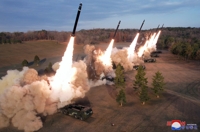 N. Korea says Kim guided simulated nuclear counterattack drills for 1st time
N. Korea says Kim guided simulated nuclear counterattack drills for 1st time -
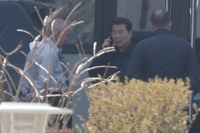 N. Korea calls envisioned U.S. aid to Ukraine 'hallucinogen'
N. Korea calls envisioned U.S. aid to Ukraine 'hallucinogen' -
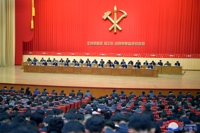 N. Korea calls on party propaganda officials to work harder
N. Korea calls on party propaganda officials to work harder
-
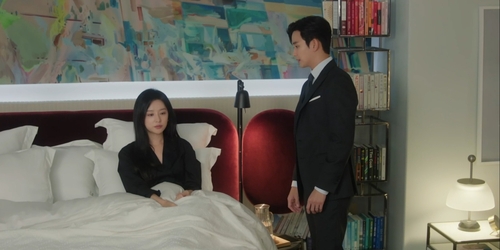 'Queen of Tears' weaves rich tapestry of Korean contemporary art
'Queen of Tears' weaves rich tapestry of Korean contemporary art -
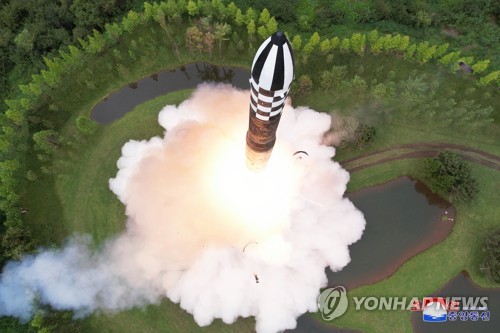 Experts see possibility of N.K. conducting nuclear test before U.S. presidential vote
Experts see possibility of N.K. conducting nuclear test before U.S. presidential vote -
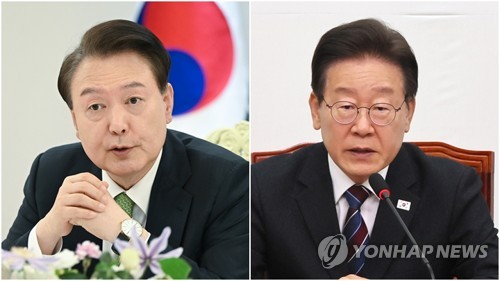 Details of meeting between Yoon, opposition leader undecided: presidential office
Details of meeting between Yoon, opposition leader undecided: presidential office -
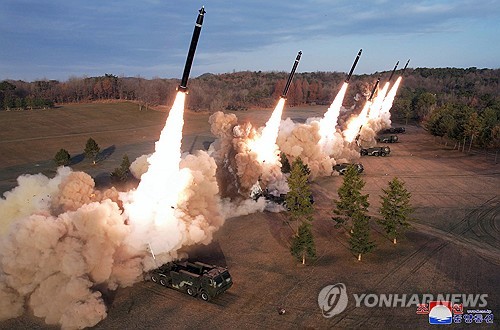 N. Korea says Kim guided simulated nuclear counterattack drills for 1st time
N. Korea says Kim guided simulated nuclear counterattack drills for 1st time -
 Looming weekly closure of major hospitals feared to worsen medical service crisis
Looming weekly closure of major hospitals feared to worsen medical service crisis
-
 S. Korea eliminated in Olympic football qualifiers as poor defense, undisciplined play prove costly
S. Korea eliminated in Olympic football qualifiers as poor defense, undisciplined play prove costly -
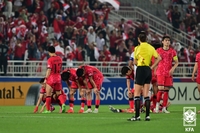 (LEAD) 10-man S. Korea lose to Indonesia to miss out on Paris Olympic football qualification
(LEAD) 10-man S. Korea lose to Indonesia to miss out on Paris Olympic football qualification -
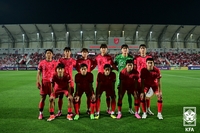 10-man S. Korea lose to Indonesia to miss out on Paris Olympic football qualification
10-man S. Korea lose to Indonesia to miss out on Paris Olympic football qualification -
 Indonesia coach left with mixed feelings after eliminating native S. Korea in Olympic football qualifiers
Indonesia coach left with mixed feelings after eliminating native S. Korea in Olympic football qualifiers -
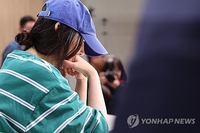 ADOR CEO calls conflict with Hybe 'worst experience of my life'
ADOR CEO calls conflict with Hybe 'worst experience of my life'















